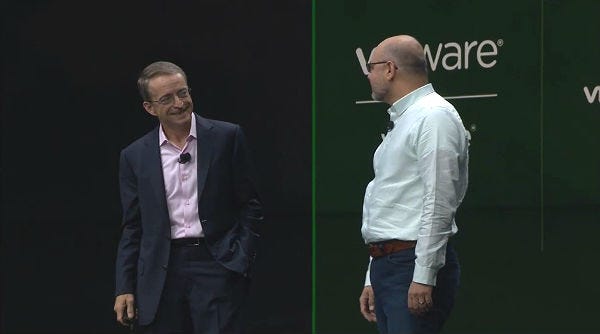VMware's Re-Acquisition of Pivotal Helps Create Tanzu for KubernetesVMware's Re-Acquisition of Pivotal Helps Create Tanzu for Kubernetes
Pivotal is a “big part” of VMware’s plan to extend vSphere to Kubernetes.
August 29, 2019

VMWORLD VMWARE — Pivotal Software will play a leading role in helping VMware extend its core vSphere virtual machine platform into the evolving new world of container-based, cloud-native applications built and managed in Kubernetes environments.
VMware’s agreement to acquire Pivotal’s outstanding shares for $2.7 billion came into focus at this week’s VMworld conference in San Francisco with the launch of Tanzu, a set of tools and services for developing, deploying and managing Kubernetes containers.
“VMware Tanzu is a portfolio of products and services to transform the way enterprises build software for Kubernetes,” said CEO Pat Gelsinger, speaking in the opening keynote at VMworld earlier this week.
Gelsinger said Pivotal’s Spring Boot is the most popular Java framework. It is downloaded an average of 75,000 times each month, while 750,000 Pivotal Application Service (PAS) instances are now deployed. VMware, which already held a controlling stake in Pivotal, is effectively reacquiring its remaining shares below its $4 billion valuation right after last year’s IPO.
Pivotal wasn’t profitable, however, and in May the company lowered guidance sharply, causing its shares to plummet by 40% in a single day. Pivotal estimated that revenue for its current fiscal year will reach approximately $760 million, up from last year’s $657.5 million.
“Although Pivotal’s revenue is less than one-tenth of VMware’s, Pivotal has the relationships with developers and DevOps teams in some of the most innovative enterprises — the companies putting cloud-native development practices, architectures and platforms in place,” in a Forrester Research principal analyst Dave Bartoletti wrote in a blog posted last week.
EMC and VMware acquired Pivotal Labs and spun out Pivotal Software in 2013 with a $100 million investment from GE. Having spawned the open source Cloud Foundry platform that’s supported by IBM, Google, SAP, SUSE, Microsoft and others, PAS is an application environment for developers to build and deploy Java, .NET and Node applications. More recently, Pivotal has put significant resources into Kubernetes, now the de facto standard for managing container workloads across platforms and clouds.

Heptio CTO Joe Beda (right) on stage with VMware CEO Pat Gelsinger this week at VMworld 2019 in San Francisco. Photo courtesy VMware.
The Pivotal Container Service (PKS), released 18 months ago, is the company’s enterprise Kubernetes platform for container workloads that can run in most public and private cloud environments. PKS is the underlying platform for Tanzu, along with the Kubernetes packaging technology VMware gained from the recent acquisition of Bitnami, which provides an application packaging solution that works in Kubernetes environments, Gelsinger said. VMware also got key Kubernetes technology and leadership from last year’s acquisition of Heptio, whose CTO Joe Beda was an original developer of Kubernetes at Google. While VMware already had a controlling interest in Pivotal, Gelsinger signaled that VMware plans to bring the company in-house.
“Pivotal is really a big part of the VMware Tanzu story,” said Beda, who joined Gelsinger on stage during the VMworld keynote. “We’ve seen Pivotal really embrace Kubernetes. They’re already actively moving Pivotal Application Service in Cloud Foundry and working with the Cloud Foundry community to run on top of Kubernetes. This is alpha now; they’re ensuring that Spring works great on top of Kubernetes. And they’re getting involved in all sorts of open-source projects, both those starting from pivotal, but also the larger Kubernetes ecosystem.”
Among the first components in the Tanzu portfolio outlined at VMworld is Project Pacific, a platform that will transform VMware vSphere and ESXi VMs into native Kubernetes native.
“Project Pacific unites vSphere and Kubernetes and unites developers and operators,” Gelsinger said, noting the release of the first preview this week. VMware also revealed Tanzu Mission Control, a common management plane that will let …
… service providers or customers their Kubernetes clusters regardless of where they’re deployed.
While Pivotal was already helping VMware add Kubernetes support to vSphere, bringing the two together should reduce duplicate development efforts and overlapping products, according to the Forrester blog. However, Forrester’s Bartoletti and his analyst team noted that Pivotal already has major competitors, most notably the newly combined IBM-Red Hat, and Microsoft, which last week announced the acquisition of jClarity, a lead contributor to the AdoptOpenJDK project.
“VMware must get over its insistence on only its infrastructure if it hopes to serve customers as an alternative to IBM-Red Hat, in particular, and the major cloud platform providers in general, the Forrester analysts opined. “Microsoft embraces Linux and Java workloads on Azure because they drive revenue via consumption-based billing. Look for VMware to embrace ‘Pivotal Everywhere’ in a similar way — as long as it spins VMware revenue dials. In the process, it creates an opportunity to migrate revenue it generates on its own to an adjacent market: the application platform.”
The acquisition should provide a more uniform go-to-market effort. While Pivotal has a formidable consulting organization focused on those building and deploying new cloud-native applications, the company started expanding its systems integration program over the past two years with partners such as Capgemini, Accenture and Cognizant, and smaller players such as Magenic and Perficient, said Ian Andrews, senior VP of products at Pivotal, in an earlier interview during the Cloud Foundry Foundation Summit.
“We’ve actually built out a partner enablement and certification program for these SIs,” Andrews said. “And that’s an important point for us, is we don’t expect to do all that app modernization work ourselves. Any one of our large clients could really consume our entire consulting business. So, working with these big partners, becomes really, really important for us. And they’ve all grown significant in terms of revenues, in their practices around Pivotal.”
About the Author
You May Also Like


